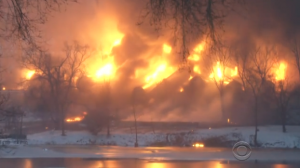The small town of Pembroke in southwest Virginia is used to seeing endlessly long unit trains of coal cars rumbling past. But last week, it got an unexpected surprise – trains of similar length hauling crude oil from North Dakota’s Bakken fields started going by.
According to Reuters, Pembroke is one of many Virginia towns that are being affected by CSX’s derailment and explosion of oil tank cars filled with Bakken oil a few miles east of Montgomery, W.Va. on Feb. 16. The massive blast sent fireballs hundreds of feet in the air and forced the evacuation of nearby residents including a college. It also stopped all rail traffic on a major, east-west CSX line for days.
A similar derailment involving a CSX oil train happened last April in Lynchburg on the same rail mainline. Several tank cars caught fire down causing a fire and a spill into the James River.
So, after the West Virginia incident, CSX got in touch with rival Norfolk Southern to see if it could reroute oil trains on some of its lines.
This brings up another issue – who should be informed when new railroad trains hauling potentially explosive or otherwise hazardous cargoes suddenly show up in your backyard? Do they have to tell you so you can get the flashlight, thermos and sleeping bag ready for your immediate evacuation if necessary?
CSX says it has informed appropriate public safety officials of such route changes, but is loath to let the general public in where it is sending unusual trains. Security and proprietary information, you understand.
CSX needs to keep its tank cars rolling to big oil terminal in Yorktown near the Chesapeake Bay. That site had been an Amoco refinery for years but the refinery shut down and was switched to an oil water terminal now owned by Houston-based Plains All-American.
The facility receives Bakken shale oil cars and loads the crude on barges that are then pushed or towed to East Coast refineries, notably in the Philadelphia area. Presumably, if petroleum exports from the U.S. start again, the Yorktown site would be excellent embarkation point.
So, instead of having tank cars with Bakken crude trundling from Charleston, W.Va. through the New River Gorge and on to Lynchburg, they will go on more southerly NS lines through places like Pembroke and Roanoke. Then they will be switched at Petersburg to CSX lines and go north to Richmond and east to Yorktown.
It looks like Richmond could potentially get it either way. On the usual route, oil trains pass by downtown on an elevated bridge which would be quite a mess if a derailment happened there. According to the Forest Ethics Website, all of downtown Richmond to about one half of a mile on either side would have to be evacuated if a major derailment with fires and explosions came.
With the temporary rerouting, Richmond would still be in serious jeopardy in case of a derailment. If I’m reading the map correctly, trains would still pass through the city.
So, you have to ask yourself – why does CSX get away with keeping all this secret? They claim they let “appropriate” public safety officials know, but the Richmond Times Dispatch last year quoted a Richmond fire officer in charge of hazardous situations as saying he had a hard time learning from CSX what a “worse case” scenario would be in the event of a Richmond derailment.
Part of the problem is PR. Bakken shale oil comes from controversial hydraulic fracturing. The uptick in production has turned America’s energy picture on its head. It has also made for big jumps in oil rail traffic. Another problem is that Bakken oil tends to be more explosive than other types.
According to the Association of American Railroads, oil shipments by rail jumped by 9,500 carloads in 2008 to 500,000 shipments last year. Accidents are way up. In 2013, tank cars carrying Bakken crude somehow got loose in Lac-Megantic, Quebec. They rolled through the small town, derailed and exploded. The blast killed 47 and wiped out half of downtown.
According to a recent probe by the Associated Press, a federal study predicts that oil shipments will rise to 900,000 shipments this year. The study predicts that trains hauling petroleum will derail 10 times a year over the next two decades. They could possibly cause $4 billion in damages and kill hundreds of people, the AP reports.
What to do? Build pipelines, I guess, but that’s been highly controversial as well as the experience with Dominion Transportation’s efforts with a $5 billion gas pipeline through the state and the controversy over the Keystone XL show.
Better, newer, safer tank cars? Maybe, but the West Virginia and Lynchburg derailments both involved new “1232” models. The same type also caught fire recently in Timmins, Ontario.
Federal rules require railroads to tell local officials where they are carrying Bakken crude, which is more explosive than other types. Railroads like CSX claim the information is proprietary, according to Reuters. That’s rather pointless. If the goal is to keep “proprietary” information from competitors, Norfolk Southern, CSX’s biggest competitor, already knows about it because it has agreed to let CSX use its rail lines.
And don’t ask some public officials. West Virginia officials have gone along with keeping much of the information secret. Mountain State officials responded to an Freedom of Information Act request by redacting much of the data they finally gave out.
Not only do the railroads need to clean up their act, they should be forced to be more forthcoming about where the next evacuation might be.



